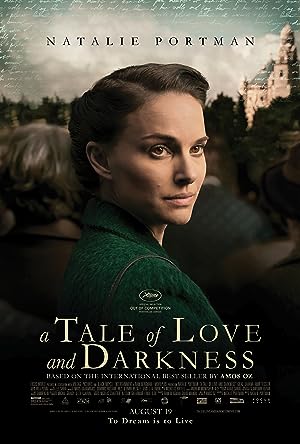A Tale of Love and Darkness is an adaptation of Amos Oz’s autobiography, but I know nothing about him and was attracted to the film because it was set in Israel and had a surreal, oneiric quality when I saw the preview. Natalie Portman directed it, and the film’s dialogue is almost entirely in Hebrew with English subtitles.
Portman as a director shows some promise unlike many of her fellow actors turned directors, but ultimately failed to sustain the most intriguing themes throughout the film because she felt like the star of the movie, not the child, and neither are given as complete focus as needed to convey those complex themes.
A Tale of Love and Darkness starts with an intriguing idea of Oz as a sort of time traveler able to occupy the present and past simultaneously, but this idea is dropped after the first third of the movie though the narration remains. There is an idea of the land imbuing him with this quality to literally be able as a man to see his younger self as he lives his life, but unable to interfere and interact with those memories. This visual representation was a genius way to depict the concept of remembering and writing and the only coherent way to time travel. I liked this sci-fi approach to his life, but his life barely has center stage.
A Tale of Love and Darkness seems primarily concerned with the math of Oz’s existence by largely focusing on the parents as individuals and how some of their qualities influence him. The father plays a more important role in the beginning of the film, but Portman as his mom pretty much takes center stage for the entire movie, which is fair because generally mothers are the people who dominate a child’s life; however the film is supposed to primarily be about the child so either it failed, or it succeeded and is accurate to the way that Oz wrote about his life story. The movie stops focusing on time travel, and uses that same visual technique to show how the mother and child are transformed into other characters in different places to illustrate the effect that his mother’s storytelling had on them. They are travelers with no barriers to their existence. It tempered my disappointment that the movie was no longer going to show Oz as a time traveler in the telling of his story, but then as his mother suffers from a mental illness, and she stops telling stories, this device is completely dropped even though Oz tells stories, and it could have been explored further.
Instead A Tale of Love and Darkness becomes more like an autobiography of the state of Israel than a coming of age story affected by the birth of Israel although the gradual decline of the family unit is also explored towards the end. Once you see the reams of archival footage, the stage feels too crowded, and I began to mentally disengage with the story. There are already a ton of important concepts being bandied around regarding the characters: identity, how women perpetuate patriarchy and harm themselves, the role of PTSD once survival is over, shame and the idea of the beneficial lie, comparing and contrasting dreams with reality. The hardest part about adapting a book is which parts can be left out without destroying the spirit of the story. Because I have not read the book, I may be completely wrong, and Portman succeeded in translating it to the screen, but as a viewer, she lost me.
A Tale of Love and Darkness failed to work for me because it is too ambitious. It wants to be about Oz, but it ends up being about his mother and Israel. If the entire movie was solely devoted to one of the latter, then it probably could have worked, but because everyone takes turns taking center stage then is removed from focus without any rhythm that I could discern, I lost interest. Inadvertently the one sustained note that I don’t think that Portman was going for was the supporting character of the father’s ego, and by the end of the movie, I was irritated by him, and a little bit by Oz the child. It is one thing to intellectually understand that it is natural for a child to think that he caused something bad to happen, but quite another to watch it. Can this woman have a breakdown without having to prop y’all up? To be fair, even today we don’t know how to handle mental illness so I’m not blaming the way that anyone tried to treat her condition, but I’m just irritated that her health improving is not about her getting better, but her getting better so she can continue to be important to them. It is human nature, but in this case, it felt especially gendered, which probably was the point.
I have no idea if Hirokazu Koreeda influenced Portman, but A Tale of Love and Darkness showed the same discretion in refusing to show the actual impact of the violent moment, particularly when it comes to children in danger. I definitely think that some visual cues and narrative turning points were lost in translation. Some supporting characters are introduced and seem pivotal then never appear again.
A Tale of Love and Darkness is probably a movie targeted at audiences already familiar with the story, not for acolytes such as myself. I would definitely watch another film directed by Portman, especially if it was not based on an unfamiliar adaptation. She didn’t make any of the typical rookie mistakes of a first time director and showed that if she kept at this type of work, her vision would be unique and beautiful.
Stay In The Know
Join my mailing list to get updates about recent reviews, upcoming speaking engagements, and film news.





